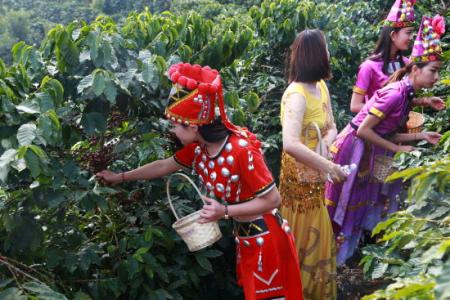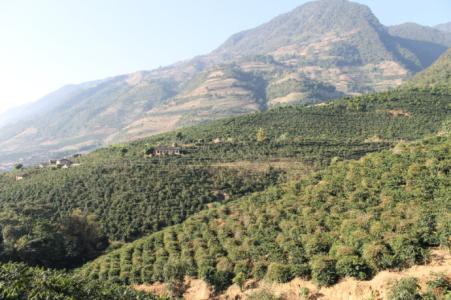Coffee consumption Culture-Why Starbucks can sell at high prices in China
The article holds that an important issue is culture. Since China opened its economy to the outside world and imported products from abroad in the late 1970s, these imports have gained some preference from image-conscious consumers.
Wang Fei, a consultant in Washington, grew up in Wuhan. "traditionally, foreign products are considered to be better in workmanship, more tasteful and better," he said. People's social status is determined by what they have. "
The article points out that high prices are not a hindrance, but attract people who want to show off their newfound wealth. In other words, paying a high price for a cup of coffee is an effective way to show your face "in business or in relationships". The lucky thing for Starbucks is that it entered China at a time when coffee was popular among China's fashionable young consumers.
But there are signs that China's preference for high-priced imports may be waning. With the rise of e-commerce and increasingly frequent foreign travel, Chinese consumers have begun to feel that they are paying too much for insignificant recreational items such as a cup of coffee. "when I returned to China after living in the United States for some time, I was shocked to find that Starbucks was so expensive," Wang said. "
This trend seems to be happening in other industries, too: a complaining shopper once told the Wall Street Journal that it is really "not worth shopping in China" in the future.
Imagine walking into a Starbucks coffee shop and finding that a large latte sells for about $27. People are likely to think that the world's supply of coffee ingredients has suddenly disappeared, or that they have traveled into the future decades from now.
The artificially inflated price gives people a truthful understanding of the relative fees paid by Chinese people to buy Starbucks drinks (adjusted for per capita income), the article said. China's per capita income is about $7200 (the per capita disposable income of urban residents in 2012 was 24565 yuan, or about $3981, according to the National Bureau of Statistics), slightly more than 1/6 of that in the United States. However, at Starbucks stores in Beijing, large lattes sell for $4.80, $1 more than in the United States. Simple espresso with boiled milk has become a ridiculously expensive luxury in China.
Such being the case, it is surprising that Starbucks can still survive in China. But in fact, the Seattle coffee empire's Chinese business is booming. In December 2012, Bloomberg News reported that Starbucks plans to double its Chinese workforce by 2015 and open hundreds of new stores in cities across the country. Starbucks even expects China to become its second-largest market after the United States.
To be fair, the article points out that it is somewhat extensive to measure the purchasing power of Starbucks' actual customer base in terms of per capita income: most Starbucks stores are located in China's big cities, where the income of most people is much higher than the national per capita level. What is striking, however, is that in a developing country that lacks a local coffee consumption culture, so many people are willing to pay high prices for Starbucks coffee. Logically, wouldn't it be reasonable for Starbucks to lower its price slightly in order to attract more customers?
So, if Starbucks is very expensive in China, why is it still so popular? Most cities in China have coffee shops that sell similar fast-food coffee at much lower prices and in an equally comfortable environment. How did Starbucks become popular?

Important Notice :
前街咖啡 FrontStreet Coffee has moved to new addredd:
FrontStreet Coffee Address: 315,Donghua East Road,GuangZhou
Tel:020 38364473
- Prev

There is an urgent need to "polish" the local brand consciousness of Yunnan coffee with a hundred-year history of ups and downs.
The second stage of groping planting in the land reclamation system in the 1970s was 1978-1988, and most of the land reclamation systems tried to plant. This stage is a stage of ups and downs, and it is also in the exploratory stage. Until the end of 1976, the shadow of coffee trees could only be seen by the roadside of Yunnan-Burma Road, or in the courtyard of farmers. The coffee planted by missionaries in the remote village of Zhukula due to geographical reasons.
- Next

Yunnan Coffee Trading Center signs strategic cooperation agreement with one of the world's largest traders
Established in October 2014, Yunnan Coffee Trading Center has a coffee trading headquarters, a boutique processing park, three coffee collection centers and a coffee delivery warehouse. Supported by scientific and standardized coffee storage facilities and advanced coffee trading, logistics system, technical support and financial services, the Center strives to build a origin-based trading center and industry serving coffee farmers and coffee enterprises.
Related
- What is the difference between Indonesian Sumatra Mantinin coffee and gold Mantinin? How to distinguish between real and fake golden Mantelin coffee?
- What does bypass mean in coffee? Why can hand-brewed coffee and water make it better?
- Unexpected! Ruixing Telunsu lattes use a smoothie machine to foam milk?!
- % Arabia's first store in Henan opens into the village?! Netizen: Thought it was P's
- Does an authentic standard mocha coffee recipe use chocolate sauce or powder? Mocha Latte/Dirty Coffee/Salty Mocha Coffee Recipe Share!
- What is the difference between Vietnam egg coffee and Norway egg coffee? Hand-brewed single product coffee filter paper filter cloth filter flat solution!
- What is the difference between sun-cured and honey-treated coffee? What are the differences in the flavor characteristics of sun-honey coffee?
- How to make Italian latte! How much milk does a standard latte use/what should the ratio of coffee to milk be?
- How to make butter American/butter latte/butter Dirty coffee? Is hand-brewed coffee good with butter?
- Is Dirty the cold version of Australian White? What is the difference between dirty coffee/decent coffee and Australian white espresso?

